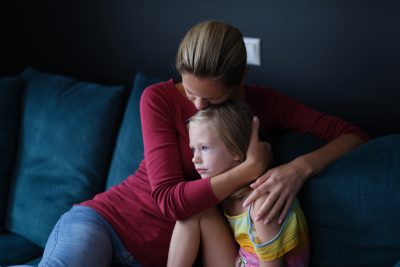 Parenting is no easy task! Our lives can feel very hectic and parents are balancing busy schedules. E-mails, Facebook posts, chats, tweets, to-do lists, work deadlines, bills, a messy house; these things are always competing for our time. However, what really deserves our attention? Parents would universally say that our children and their well-being is our highest priority, though sometimes our actions don’t convey that. Evidence supports that our relationship with our children is the most influential predictor of their physical and mental health as well as social and academic functioning. Being more mindful in our interactions with our children is a strategy to support that relationship.
Parenting is no easy task! Our lives can feel very hectic and parents are balancing busy schedules. E-mails, Facebook posts, chats, tweets, to-do lists, work deadlines, bills, a messy house; these things are always competing for our time. However, what really deserves our attention? Parents would universally say that our children and their well-being is our highest priority, though sometimes our actions don’t convey that. Evidence supports that our relationship with our children is the most influential predictor of their physical and mental health as well as social and academic functioning. Being more mindful in our interactions with our children is a strategy to support that relationship.
Kids notice when we are stressed, overwhelmed, and not giving them our full attention. In fact, kids often work harder for our attention when they notice that we are too busy and they can end up seeking our attention in less than ideal ways.
What is mindfulness?
Mindfulness can very simply be defined as learning to focus your mind and attention. Its practice has been around for a very long time. While it sounds quite simple, it’s no easy task. Mindfulness is focusing on the present. It’s accepting the present and all it includes, without trying to change it and without trying to judge it.
So what does this look like? Mindfulness can be a focus on breath and body awareness. For example, take a few moments, maybe when in the shower or standing quietly in the grocery line, and just notice your breath, paying attention to each breath in and out. Notice how your muscles feel. Notice the thoughts that you’re having, accept that they are there, and then come back to the present moment. We can easily get wrapped up in our thoughts and miss what’s going on now.
Mindfulness is also a focus on and awareness of our choices. We can choose to notice a situation or a thought without judging it. We can choose to slow down and experience it. We can choose to notice the simple pleasures. Again, this is not easy. It takes practice!
How can this be applied to parenting?
Mindful parenting is being aware of how you and your kids are feeling at the moment. It means listening with your full attention. It involves noticing and accepting the thoughts you are having, while not trying to change or obsess about them.
As the evening is nearing an end and I’m thinking about a deadline at work, looking around the living room at the mess of toys strung about, and thinking about rushing through a bedtime routine, it could be easy to get worked up and focus on “fixing” those things. Though while I’m worked up and hurrying around the living room gathering toys and responding to the sound of another email popping into my inbox, I’m missing an opportunity with my children. I’m not truly listening to what my daughter is telling me about her day at school. I’m not hearing the description of the double play in the baseball game that is exciting my son. I’m missing the smiles and attempts my baby is making at a peek-a-boo game from behind the side of the couch. I don’t want to miss these things! I don’t want to miss them, but I can become too wrapped up in my thoughts and plans to actually experience them. Taking a few minutes to be fully engaged with my children, paying full attention to what they are doing is enjoyable for me and for my children. I can notice that I have these thoughts about work and toys all over the room and then can choose to focus on what my children are doing. Children are perceptive. They know when we are fully attending to them.
Mindful parenting also means being more aware of the choices we have in our interactions with our children. When we are aware of these things that are happening in the moment, it allows us to be less reactive. We can feel calmer, more engaged, and more focused. We may be displeased with their actions, but can take a breath, become aware of how we are feeling, and then make a choice.
This does not mean that we will refrain from providing redirection or consequences when needed. These parenting jobs are still required. However, it can allow us to engage in these tasks without being distracted by our phones, or racing thoughts, or those to-do lists. Mindfulness allows us to take a breath and choose how we want to respond. It can help to keep in mind what is truly important.
Mindful parenting should not feel like another pressure. It is not a goal that we have to achieve, but rather an approach to situations. We will not be successful in this throughout the whole day. However, it’s a chance to start each situation with an attempt to focus on the present.
Our children are only this age one time. Tomorrow they will be older. Take a few minutes today to simply be present and enjoy your time with them. Try taking a few moments each day to focus on being present with your children – all distractions aside. Parenting is a great thing to be experienced!





Comments